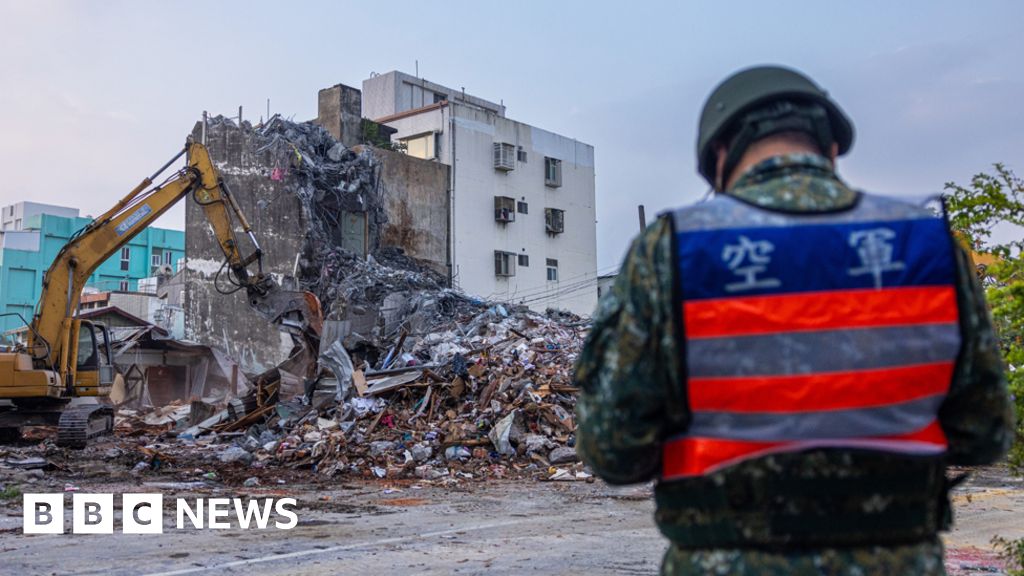- Written by Rupert Wingfield-Hayes and Kelly Ng
- in Hualien and Singapore
Impact of the magnitude 7.4 earthquake that occurred in Taiwan
Rescue teams are working to reach more than 600 stranded people a day after Taiwan's worst earthquake in 25 years.
One survivor described how the shaking caused rockslides “like bullets” around the mine where he worked.
A magnitude 7.4 earthquake struck near eastern Hualien County, killing nine people and injuring more than 1,000.
Some of those stranded in the tunnels and near the national park were rescued by helicopter, but 34 people remain missing.
The official number of people trapped or stranded increased significantly from about 100 to 646 on Thursday, as phone signal began to be restored in the mountainous region.
Most are not believed to be in danger, but roads are blocked and people are stranded. Authorities are now trying to figure out the best way to get them out.
Local reports said food was airdropped to dozens of people trapped in these areas.
“It started raining rocks like bullets from the mountain. There was nowhere to run. Everyone ran and hid next to the sandbags,” a survivor (surname: Chu) told Taiwan's Central News Agency. Told.
Three of the nine people killed were hikers on a trail heading into Taroko National Park, named after the landmark canyon on the outskirts of Hualien.
Relief efforts are moving quickly in Hualien City, the capital of the province where the quake occurred, with workers using excavators and other heavy equipment to demolish some damaged buildings.
On Thursday morning, the BBC also witnessed rescue workers removing a huge boulder the size of a car that had fallen near the railway tracks to allow normal train services to resume.
They are also using large amounts of gravel and rock to shore up the 10-story building, known as the Uranus Building, which has been tilted downward since the quake and if another aftershock occurs. This prevents the building from collapsing.
According to local reports, a female teacher died inside the building when she returned to rescue the cat.
The red brick Uranus building can be seen leaning precariously.
Su Qiuyue, who was working opposite the Uranus building when it collapsed, told the BBC: “I was shaking so much I could barely walk. I was really scared. I felt like I had no control over my legs anymore. My colleague. They dragged me out so we could get out.”
“While I was out, a large amount of dust entered the building… [later] “I realized it was coming from a building across the street that had partially collapsed,” said the 50-year-old.
Another Hualien resident described how his home was thrown into chaos by the earthquake.
“I just got out of bed and the clothes rack and low cabinet fell over,” Ocean Tsai told BBC Chinese.
“The wind was getting stronger and stronger and I was worried about my belongings. Fortunately, other than my bike falling over, the damage was minimal.”
The quake, which struck 18 kilometers (11 miles) south of Hualien, subsequently triggered more than 200 aftershocks, dozens of them at least magnitude 6.5 or higher, hampering search and rescue efforts. Taiwanese authorities expect more aftershocks in the coming days.
Photos show how the road outside Hualien's Qingshui Tunnel, one of the many winding roads that run along Hualien's rocky coastline, briefly collapsed.
Routes like Shimizu are popular with tourists because they offer spectacular views from the mountains across the Pacific Ocean. However, it is also known to be dangerous, especially due to the possibility of landslides.
In the north, the capital Taipei was also shaken violently, with images of buildings being damaged and people being evacuated. Local television stations showed footage of destroyed vehicles and stores in disarray.
“This earthquake was close to land and shallow. It was felt all over Taiwan and the offshore islands…It's the largest earthquake in the past 25 years,” Wu Chien-Fu, director of the Taipei Seismology Center, said on Wednesday.
Power outages and internet outages were reported across the island.
The quake prompted tsunami warnings for nearby islands in Japan and the Philippines early Wednesday, but those warnings were later downgraded.
Taiwan has a history of earthquakes, but both locals and foreigners who have lived in Taipei for years say this is the strongest quake they've experienced in decades.
The last major earthquake, magnitude 7.6, occurred in September 1999, killing 2,400 people and destroying 5,000 buildings.
Additional reporting by Fan Wang in Singapore and Tzu-Wei Liu of BBC Chinese in Taipei


